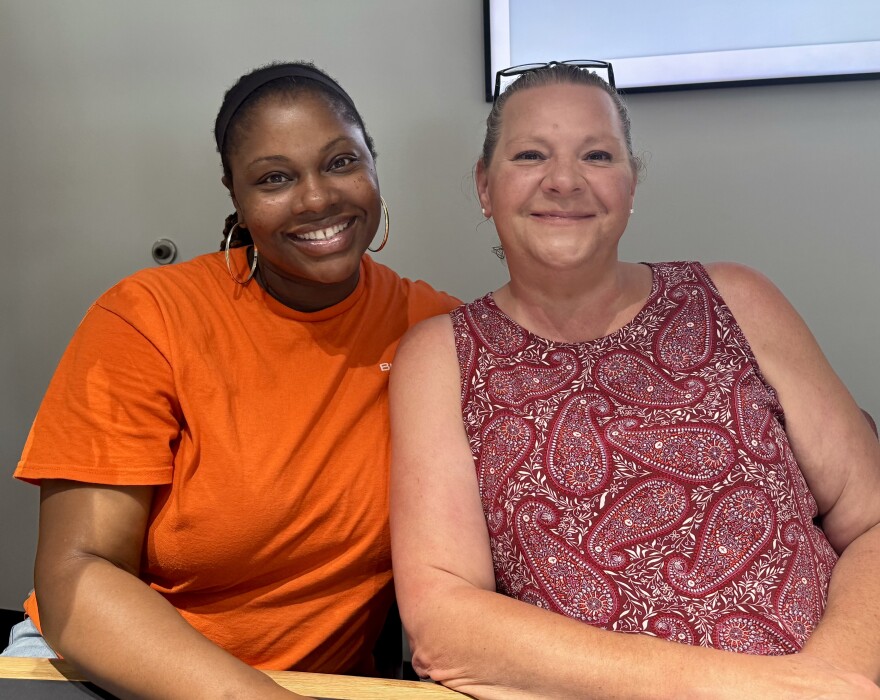The Bloomington nonprofit Brightpoint's Central Region has provided free doula services for over a decade, supporting nearly 200 parents through pregnancy, labor and delivery, and postpartum care.
Doula program manager Jasmine Martin said they've seen a sharp uptick in need for bilingual doula resources. Last year, they helped two Hispanic women. So far this year, they've supported eight Hispanic women through pregnancy.
They had to turn three away.
Martin said the high demand for their services is a good problem to have, with most referrals coming by word of mouth.
“It just makes us excited, and it makes us feel so good to know that any participant—but especially our Hispanic population—they feel seen,” said Martin. “They feel heard. They feel welcomed—so much so that they want to tell someone else about services.”
Currently, Brightpoint does not have bilingual doulas on staff. The nonprofit is hosting a pickleball fundraiser Friday, July 25, to raise funds for Spanish language education materials and interpreters.
“It’s such a need so we can try to bridge the gap as much as possible,” Martin said.
Dinks, Drinks and Donate takes place from 5-8 p.m. Friday at Evergreen Racquet Club, 3203 E. Washington St. in Bloomington.
Tickets are $30, including open play, swag, food and drinks. A combo stroller/car seat is among the raffle prizes available. Participants can contact Brightpoint development director Laura Cordero with questions at 309-834-5294 and lcordero@brightpoint.org.

Doulas provide supportive care, working with doctors and midwives by providing emotional support, non-pharmaceutical pain management and stress reduction before and after giving birth. A doula typically provides guidance from the third trimester of pregnancy through 6-8 weeks after birth, supporting new parents with nutrition for mom and baby, birth choices, breast feeding and coping skills.
Brightpoint does not charge for Doula services, which the agency sees as a gateway to their other programs aimed at promoting child welfare. They take referrals on a case-by-case basis, prioritizing doulas for the highest need clients.
“We try to save those spots for them,” Martin said. “If we have a 16-year-old first time mom, she’s probably going to be higher need than a mom whose having her fifth child in her 30s. But I would just say, if anyone is interested, reach out and we’ll take it from there.”
Martin said her profession is increasingly recognized in the medical field. They can now bill Medicaid, which according to the Illinois Department of Healthcare and Family Services covers half of all births in Illinois. Martin said sometimes a doula is the only other person besides the doctor in the delivery room.
“It’s hard for the person that’s giving birth,” she said. “And it definitely fills our cup to be able to stand in and support—even if they have a room full of people. Being able to add to that circle of support is so fulfilling.”
Martin said doulas also serve a critical role advocating for their clients—which is especially important for women of color. Black women are three times more likely than white women to die after giving birth. Pain and symptoms expressed by people of color are statistically less likely to be believed by doctors. For Martin, that’s a reason to push for resources to meet higher demand for services from Hispanic women in her program.
“The health disparities that we still continue to navigate in our country with our Black and brown families—also the panic and the fear that goes along with that,” Martin said. “Some of those families go into the hospital wondering, are me and my baby gonna make it out of here? That’s intense.”
As a doula, Martin’s top priority is hearing and validating those concerns, “but also helping them to find their voice and the courage to be able to speak up and really say what they’re feeling and thinking.”



